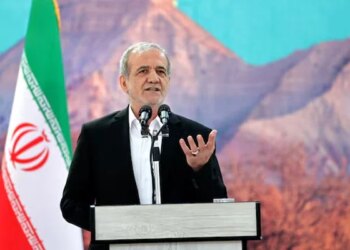Select Language:
On August 23rd, the 2025 China Computing Power Conference took place in Datong, Shanxi Province, marking its latest edition with significant industry participation. Lenovo Group, a global leader in infrastructure and AI services, was invited for the third consecutive time to attend this influential event.
During the conference, Lenovo’s Vice President and General Manager of the China Infrastructure Business Unit, Chen Zhenkuan, unveiled the “2025 AI Strategy Empowerment White Paper.” This publication represents Lenovo’s second major initiative in the field of heterogeneous intelligent computing, following the launch of the Heterogeneous Intelligent Computing Ecosystem Alliance last year, in partnership with the China Intelligent Computing Industry Alliance and other collaborators.
The white paper provides a comprehensive outlook on technological evolution and features practical case studies across various industries. It aims to chart a clear pathway for digital transformation driven by AI, envisioning a future where AI applications and emerging infrastructure seamlessly integrate. In his keynote speech, Chen emphasized that the development of AI hinges on three key pillars: computing power, models, and applications. He highlighted that their interconnected growth is propelling the AI wave through cyclical advancements.
In addition to strategic releases, Lenovo received notable recognition at the event. The company’s integrated large-scale model training and deployment solution was awarded the “Major Breakthrough Achievement of the Year,” marking Lenovo’s second consecutive year winning a distinguished accolade at this conference. Last year, Lenovo’s heterogenous intelligent computing platform was honored as a significant milestone in China’s computing industry.
Showcasing its technological strengths, Lenovo presented a broad array of products and solutions across smart computing, high-performance computing, and versatile general-purpose computing scenarios. Of particular note was the launch of the Lenovo Wanquan Heterogeneous Intelligent Computing Platform 3.0, which now includes innovative features such as AI inference acceleration algorithms, compiler optimizations, fault prediction and self-healing systems for training and inference nodes, and expert parallel communication algorithms.
A highlight of their exhibit was the demonstration of the “dual-cycle” phase-change immersion cooling system, which achieved an industry-leading Power Usage Effectiveness (PUE) of 1.035. This milestone indicates that 96.6% of electrical energy is directly funneled into AI training and inference, significantly enhancing energy efficiency.
In high-performance computing, Lenovo showcased the ThinkSystem SC750 V4 server, equipped with the “Ask Tian Hai Shen” hot water cooling technology. This system reduces power consumption by 40% compared to conventional air-cooled solutions and achieves a PUE below 1.1. The technology is already integrated into Shanghai Jiao Tong University’s “Siyuan No. 1” supercomputer.
In terms of AI-enabled devices, Lenovo displayed its latest innovations, including the Tianxi personal super-intelligent agent, the ThinkBook Plus Rollable AI with a flexible scrollable display, and the YOGA Pad Pro 14.5 AI Edition tablet. These products exemplify next-generation human-computer interactions across different platforms and devices.
Since 2017, Lenovo has been developing a complete AI ecosystem that encompasses AI terminals, infrastructure, solutions, and services. As AI continues to permeate industries at an accelerated rate, computing power is increasingly recognized as the vital enabler of new productivity. By adopting a hybrid AI approach, Lenovo champions the democratization of computing resources, supporting widespread industrial digitalization and intelligent transformation endeavors across sectors.






